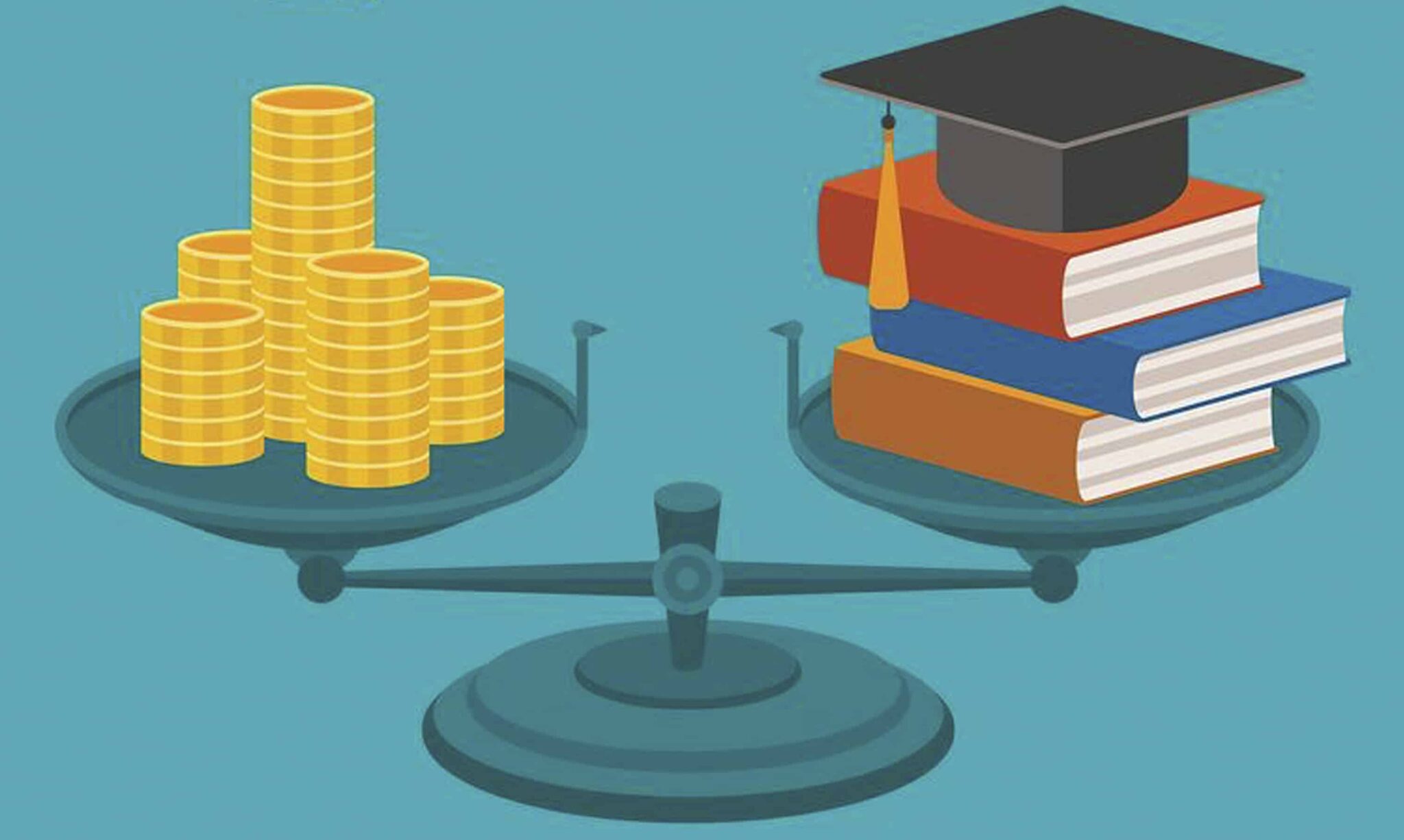
Getting an MBA is expensive. The Masters of Business Administration degree is a great way to bolster your business skills - but it does come at a price. According to a recent Investopedia article, the average cost of tuition alone for a 2 year MBA program is $80,000. And that's just tuition alone.
When you factor in the other expenses like books, room and board, and more, you could start seeing the price climb to between $100,000 and $200,000. And for a full time program, the opportunity cost of lost wages could be huge.
Whether you're looking at a part-time MBA program or a full-time MBA program, you're likely going to need student loans as one part of your financial aid pie. Here's what you need to know about paying for your MBA program, including the best student loan options to pay for your MBA.
If you already know most of your options and are simply looking to find the best private student loans, check out Credible and compare your options in 2 minutes. Try Credible here.
Let's break it down.
The Order Of Operations To Pay For Your MBA
There is a smart order of operations to pay for your MBA program - and it doesn't start with student loans. Before you ever embark on an MBA program, you need to strongly consider the ROI (Return On Investment) of your MBA program.
The goal of an advanced degree, like an MBA, is to help you move your career (and salary) forward. Beyond your current job, an MBA also enables you to build a stronger network that might allow you to get a better job after graduation.
However, you need to align your MBA with your skills and job experience. An MBA loses a lot of it's value within 1-2 years after graduation. As such, you need to combine your MBA with your skills to maximize it's value. If you're over-educated and under-experienced, you won't see a great ROI.
When it comes to calculating the ROI, it's all about how much you're going to spend, and how much debt you're going to take on. Follow this list from best to worst to get an idea of how to pay for your MBA program.
- Employer Tuition Assistance Programs
- Your Own Savings
- Scholarships and Grants
- Direct PLUS Student Loans
- Private Student Loans
Of course, there are variations on a theme - especially when it comes to paying for an MBA. For example, your employer might cover all the costs of tuition, and you just need to pay for the remaining items. This could lead you to change your order of operations, since Direct PLUS loans might be off the table.
It's always important to analyze what you need for your own situation.
Employer Tuition Assistance Programs
One of the awesome things about an MBA program is that many employers also different tuition assistance programs to help pay for all (or some) of the cost of getting your MBA. These programs might go under the name Tuition Reimbursement Program or Tuition Assistance Program.
For example, in my situation, my employer offered to reimburse me $5,250 per year until my MBA was paid off. This was win-win. It allowed me to get an MBA almost free, and my employer received some assurance that I would stick around - if I left, I didn't get any of the accrued money that was owed to me.
As such, I had to take out student loans up front to pay for my MBA, but my employer reimbursed me annually until the student loans were paid off.
There are also student loan repayment programs that some employers are starting to offer. These can be a great asset if you already have student loans.
Your Own Savings
After looking into employer assistance programs, you can potentially consider using your own savings. This is especially true for individuals who are going back to school mid-career. You might have enough in savings to make a strong dent in the cost of your MBA program.
A few rules to keep in mind when using your own savings to pay for an MBA:
- Never use retirement plan money (i.e. don't pull or take a loan from your 401k, IRA, etc.)
- Ensure that you have an emergency fund of at least 6 months
If you follow those rules, it's safe to use the other money to pay for school. This could significantly reduce or eliminate the amount of student loans you would potentially need to borrow.
Scholarships And Grants
Going back to school for an MBA, you might to even have considered scholarships and grants as something MBA candidates "do". But there is definitely free money available to graduate students like MBA candidates, and you should take advantage.
Check out this list of MBA scholarships available.
Also, don't dismiss grants either. There are a lot of different grants that you might qualify for if you put some time and research into it. Check out our guide on using grants to pay for college.
Direct PLUS Graduate Student Loans
If you've exhausted all the options to pay for your MBA, it's time to look at Direct PLUS Graduate Student Loans.
These loans can be take out to cover the maximum cost of attendance (according to your schools' financial aid office), minus any other financial aid received. For most MBA candidates taking out student loans, Direct PLUS Loans can make up the difference of what's needed to pay for college.
A Direct PLUS Loan does require a credit check, so if you have a poor credit history, you may need a cosigner to help you with the student loan.
Direct PLUS Loans have some of the highest interest rates for Federal loans, so it's important to consider that when borrowing. If you have excellent credit, you might want to consider other options now or later.
Private Student Loans
Some MBA candidates cannot solely rely on Federal loans to pay for the cost of getting an MBA.
Either they exhaust Federal loan limits due to their school’s cost, they need more funds to cover living expenses while attending school, or they need more time to complete their education (which increases cost).
Others may find more value in taking on private loans given their excellent credit and ability to repay. In this case, private student loans may be a cheaper alternative due to low interest rates and excellent borrower programs.
We recommend borrowers shop and compare their private student loan options on Credible. We love Credible for a few reasons. They allow you to see your options in minutes. The compare most of the major lenders. And they make the process of getting a private loan super easy.
Credible also has some of our favorite lenders for paying for graduate school, such as Citizens Bank.
Check out Credible here for your private student loan needs.
Refinancing Student Loans After Graduation
If you're finding this article after you've already taken out loans for your MBA, you might consider student loan refinancing.
If you have private loans or high-interest Federal Loans (like the Direct PLUS Loans mentioned above), refinancing might allow you to lower your payment or save on interest on your MBA student loans. Through refinancing, you take out a new student loan from a private lender and use it pay off your other loans. With the new student loan, you may qualify for a lower interest rate, better repayment term, or lower monthly payment.
If you have Federal student loans, refinancing will cost you the ability to apply for an income-driven repayment plan or forbearance. That's why, for many borrowers, we don't think you should refinance your Federal student loan for a private student loan.
However, in some cases, MBA candidates are the exception to the rule. After getting your MBA, you might have the potential to see your salary rise by a significant amount of money. For many, this means they would benefit more from getting a student loan with a low interest rate, versus keeping a Federal student loan.
For example, Direct PLUS Graduate loans currently have an interest rate of 7.54%. But you can refinance with Credible and potentially save a lot in interest!
See if Credible makes sense to refinance. You can shop loans in 2 minutes. As a bonus to College Investor readers, you'll get up to a $1,000 gift card when you refinance with Credible. See terms. Check out Credible today.
Final Thoughts
The bottom line is that getting an MBA can be expensive, but for many, it's worth it. The trick is to ensure that you're figuring out how much it's worth - almost like Step 0 of your MBA education.
Remember, you can ensure that an MBA is valuable by paying as little as possible out of pocket. Start checking with your employer, and looking to maximize student loan tuition assistance programs. Only borrow in student loans what you absolutely have to.
Remember, what's the end goal of your MBA degree? Don't just go get an MBA "just 'cause'". Have a clear path to getting a return, and be mindful of how you spend and pay for it.

Robert Farrington is America’s Millennial Money Expert® and America’s Student Loan Debt Expert™, and the founder of The College Investor, a personal finance site dedicated to helping millennials escape student loan debt to start investing and building wealth for the future. You can learn more about him on the About Page or on his personal site RobertFarrington.com.
He regularly writes about investing, student loan debt, and general personal finance topics geared toward anyone wanting to earn more, get out of debt, and start building wealth for the future.
He has been quoted in major publications, including the New York Times, Wall Street Journal, Washington Post, ABC, NBC, Today, and more. He is also a regular contributor to Forbes.
Editor: Claire Tak
